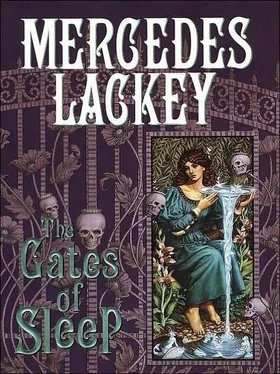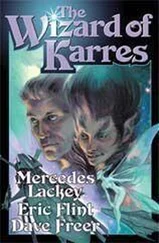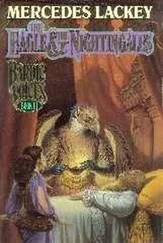“Then take her to Briareley,” Madam ordered, quite as if she had the right to give him orders. “There’s the only possible solution. Where best would it be to send her? You are here, Briareley has the facilities, and you have the staff and the expertise.” She shrugged, as if it was all decided. “We want the best for her, of course. It should be clear to you that no one here knows what to do, and wouldn’t it be more efficacious to get her professional help immediately?”
“It would be best—the sooner she has professional care, the better—” he began.
Madam interrupted him. “What is your usual fee for cases like this?”
She might have been talking about a coal-delivery, and if he had been what she thought he was—
He had to react as if he was.
He didn’t have a usual fee for cases like this because he’d never had one—but he blandly (and with open skepticism, as if he expected them to balk) named a fee that would pay for a half dozen more nurses and two more strong male attendants for Briareley, a fee so exorbitant that he was sure they would at least attempt to bargain with him. But he knew that he dared not name a price so low they would think he was eager to get Marina to Briareley—much less simply volunteer to take her without being paid. He had to look as if he was exactly what Madam thought him; a quack who was only interested in what he could get for warehousing the weak-minded and insane. He was walking a delicate line here; he had to make them think he was motivated by nothing more than money, yet he didn’t dare do anything that might cause them to send Marina elsewhere.
Stomach churned, jaws ached from being clenched, heart pounded as if he’d been running. Everything told him to get her out of here —
“Naturally,” Madam said, so quickly it made him blink. “Poor Marina’s own inheritance will more than suffice to cover your fees, and as her guardian, I will gladly authorize the disbursement.” The Odious Reggie made a sound that started as a protest, but it faded when his mother glared at him. “I’ll ring for a servant; she can be moved, of course?”
“Of course,” he agreed, then did a double take, “You mean, you wish me to take her now? Tonight?”
“In the Oakhurst carriage, of course,” Madam replied breezily. “I should think it would be the best thing of all for her to be in the proper hands immediately. We know nothing—we might make errors—she could even come to some harm at our hands.” The woman gazed limpidly up at him. “You understand, don’t you, doctor? There must be no question but what we did the best for her immediately. No question at all.”
He shook, and strove to control his trembling, at the implications behind those words. That this creature was already calculating ahead to the moment when—she expected—Marina’s poor husk would take its final breath, and Briareley would boast one less patient. If nothing else would have told him that Madam was behind this, the cold calculation in her words would have given him all the proof that he needed. This had been planned, start to finish.
“Well,” he said slowly, concentrating very hard on pulling on his gloves, “I can have no objection, if you are providing the carriage. And-ah-I can expect my fee tomorrow? I bill for the month in advance, after all.”
“Of course,” Madam agreed, and rang for a servant.
Not one, but three appeared, and when Madam had explained what she wanted, they disappeared, only to return with heavy carriage-rugs, which they wrapped Marina in carefully. Then the largest of the three picked her up.
“My people will show you to the carriage,” Madam said, needlessly.
The first two servants beckoned to him to follow, and the third carried Marina, following behind Andrew to the waiting carriage, his face as full of woe as Madam’s was empty of that emotion.
The rain had stopped; they stepped out into a courtyard lit by paraffin torches, puddles glinting yellow, reflecting the flames. A closed carriage awaited, drawn by two restive horses; one of the servants opened the carriage door, while the other pulled down the steps. Andrew got into the waiting carriage first, followed by the giant carrying Marina, who took a seat across from him, still cradling the girl against his shoulder. “Ready to go, sir.”
Andrew blinked. He had expected the man to put his burden on the seat and leave. Madam didn’t order this.
But the look in the man’s eyes spoke volumes about what he would do, whether or not Madam ordered it.
Good gad. She has the servants with her. No wonder Madam was worried about appearances.
He cleared his throat as the carriage rolled forward into the damp night, the sound of the wheels unnaturally loud, the horses’ hooves even louder. “When Miss Roeswood collapsed—did you see or hear anything—ah—”
“Peter, sir,” the giant supplied.
“Yes, Peter—have you any idea what happened to Miss Roeswood?” He waited to hear what the man would say with some impatience. “Was she, perhaps, discussing something with Madam Arachne?”
“No, sir,” the young fellow sighed. “I was polishing the silver, sir. Didn’t know nothing until Madam started shrieking like a steam-whistle, sir. Then I came running, like everybody else. We all came running, sir. Madam was standing by the fire, Miss was on the hearth-rug in a heap, Master Reggie was running out the door.”
Interesting. “Madam screamed?” he prompted.
“Yes, sir. Said Miss Roeswood had took a fit and fell down, sir, and that we was to send the carriage with Reggie to get you, on account of that you have to do with people’s brains. Said it was likely a brainstorm, sir.” The young man’s voice sounded woebegone, choked, as if he was going to cry in the next moment. “I moved her to the couch, sir, thinking it couldn’t do her any good to be a—lying on the hearth—rug. I hope I didn’t do wrong, sir—I hope I didn’t do her no harm—”
He hadn’t seen any sign that anyone had hit Marina over the head—hadn’t seen any sign that she might have cracked her own skull as she fell—so he was able to reassure the poor fellow that he hadn’t done wrong. “This could be anything, Peter—but you did right to get her up out of the cold drafts.”
“Sir—” the young man’s voice cracked. “Sir, you are going to make her come out of this? You’re going to fix her up? You aren’t going to go and stick her in a bed and let her die, are you?”
Good Lord. His spirits rose. Whatever devilment Madam and her son had been up to at Oakhurst, it was clear that Marina had the complete loyalty of the underservants. With that—if there were any signs of what they’d been up to, all he had to do was ask for their help. And then there would be a hundred eyes looking for it at his behest, and fifty tongues ready to wag for him if he put out the word to them.
“I swear I am going to do my best, Peter,” he said fiercely. “I swear it by all that’s holy. But if there was anything going on—anything that Madam or her son were doing that might have had something to do with what’s happened to Miss Roeswood—” He groped after what to ask. “I don’t think this is an accident, Peter. And I can think of a very good reason why Madam would want something that looks like an accident to befall Miss Roeswood—”
“Say no more, sir.” Peter’s voice took on a fierceness of its own. “I get your meaning. If there was aught going on—well, you’ll be hearing of it. Hasn’t gone by us that Madam’s to get Oakhurst if aught was to happen to Miss.”
He couldn’t see the young man’s face in the darkness, but he didn’t have to. This young man was a stout young fellow, a real Devonian, honest and trustworthy, and loyal to a fault. And not to Madam. Allies. Allies and spies, of the sort that Madam is likely to disregard. By Heaven —
Читать дальше












